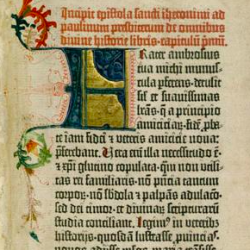Who is John?
Most people simply assume that the Gospel of John was written by John the Apostle, the son of Zebedee. But why should we think this? Nowhere in the Gospel is there any explicit statement about the author of the book. The name John appears nineteen times in the Gospel, but all these verses refer to John the Baptist, not John the Apostle. Paradoxically, the apostle John, the son of Zebedee, is never mentioned by name in the Gospel. The fundamental reason for assigning authorship to John the Apostle is the external evidence of the early Christian tradition, which makes the attribution by the mid-Second century.
While the Gospel of John never names an author, it does introduce an anonymous and somewhat mysterious figure called the "beloved disciple," the "other disciple," or the "disciple whom Jesus loved." This person is never given a name in the Gospel, but most scholars think that the Beloved Disciple is the author. At the end of the Gospel it says explicitly: "This is the [beloved] disciple who is bearing witness about these things, and who has written these things, and we know that his testimony is true" (Jn 21.24). This statement is, in a sense, the author's signature, claiming that the Beloved Disciple is the author of the Gospel, though describing himself only in the third person.
The question thus becomes: are the Beloved Disciple and the apostle John the same person? Unfortunately, this question cannot be answered with certainty, since there is no action of the Beloved Disciple that can be precisely compared with known actions of any named apostle. The Beloved Disciple appears only in John, and is only associated with events during the ministry of Jesus in Jerusalem, never in the Galilee ministry (which, by the way, is much abbreviated by John). Whoever the Beloved Disciple was, he frequently claims he is an eyewitness.
The Beloved Disciple was "known to the high priest" (Jn 18.15-16), implying some degree of wealth and social status in Jerusalem, which does not seem to match the social standing of the fisherman John of Capernaum. Eusebius records a tradition that John "was both a witness and a teacher, who reclined upon the bosom of the Lord, and being a priest wore the sacral plate [the golden crown of the High Priest, with the divine Name on it]." This tradition, if it is more than legendary, may imply that the Beloved Disciple--who knew the High Priest--was, in fact, himself a priest, as was John the Baptist. Acts 6.7 also reports that "great company of the priests were obedient to the [Christian] faith," which may have included the Beloved Disciple.
So the conclusion is that, although many scholars have proposed many possible authors, we simply don't know, and probably can't know for certain, the identity of the author of the Gospel. For the purposes of this exploration, I'll call the author John—though the Gospel may actually have been written by a different man of the same name. But whoever the author of the Gospel was, the purpose of his Gospel is clear: "these are written so that you may believe that Jesus is the Christ, the Son of God, and that by believing you may have life in his name" (Jn 20.31).
The Synoptic Problem
Even a cursory reading of John compared with Matthew, Mark and Luke reveals striking differences. Matthew, Mark and Luke are called the Synoptic ("seen with one eye") Gospels, because they exhibit a wide range of parallels in their basic outline of events, and even precise wording. Most scholars believe that the Gospel of Mark was written first, and was used by Matthew and Luke, along with other independent sources. In any case, although each Gospel has its own focus and unique features, the three Synoptic Gospels are clearly interdependent in a variety of ways, as can be seen by reading a synopsis of the Gospels which lists all of the parallel passages side by side.
The Gospel of John, on the other hand, is unique in many ways: literary structure, language, chronology, signs, lack of parables, esoteric teachings, etc. The early Christian scholar Clement of Alexandria called John's Gospel "a more spiritual gospel," which is an astute observation. John's Gospel focuses much more on the divine and esoteric aspects of Jesus' life and preaching than the synoptics. I will discuss the details of the various unique features as we encounter them. Here it is simply important to note that, reading John alone, we get a unique perspective on the life and teachings of Jesus.
Reading John Again for the First Time
Most of you have already read John; some of you have probably read it many times. Is there any reason to read John again, and read it along with my explorations and observations on the text? In my pilgrimage I'm going to take some approaches to John not generally followed by most modern readers, which I hope some of you will find intriguing.





